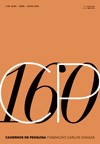Yalorixás and education: discussing religious education in schools
Keywords:
Public Education, Religious Education, Candomblé, RacismAbstract
Yalorixás are mães de santo, priestresses of the Candomblé religion. Although they receive social recognition and have the power to mobilize people, they also suffer from racism or intolerance inside or outside their own communities. This article aims to discuss the relationship between school education and religiosity from the point of view of five Yalorixás, in the Baixada Fluminense area. Through interviews and observations, carried out between May 2014 and January 2015 in four different terreiros (sacred sites) of the region, we identified how these religious leaders perceive intolerance and racism and how they critically approach religious education in the public school system of Rio de Janeiro State.
Downloads
References
ALVES FILHO, Francisco. Um rio de atabaques. Isto é, n. 1471, 10/12/1997. Disponível em: . Acesso em: abr. 2015.
BASTIDE, Roger. Imagens do Nordeste místico em preto e branco. O Cruzeiro, Rio de Janeiro, 1945.
BENISTE, José. As águas de Oxalá. 9. ed. Rio de Janeiro: Bertrand Brasil, 2012.
CAPONE, Stefania. Le pur et dégénéré: le candomblé de Rio de Janeiro ou les oppositions revisitées. Journal de la Société des Américanistes, v. 82, p. 259-292, 1996.
CAPPELLI, Rogério. Um Brasil de Áfricas: novos olhares sobre a religiosidade afro-brasileira. In: OLIVEIRA, Iolanda; SOUZA, Maria Helena Viana (Org.). Educação e população negra: contribuições para a educação das relações étnico-raciais. Niterói: Eduff, 2007. p. 285-309 (Cadernos PENESB, 9).
CAPUTO, Stela Guedes. Educação nos terreiros: e como a escola se relaciona com crianças de candomblé. Rio de Janeiro: Pallas, 2012.
CARNEIRO, Edson. Ladinos e crioulos: estudos sobre o negro no Brasil. Rio de Janeiro: Civilização Brasileira, 1964.
COSTA NETO, Antônio da. O ensino religioso e as religiões de matrizes africanas no Distrito Federal. 2010. 102f. Dissertação (Mestrado em Educação) – Faculdade de Educação, Universidade de Brasília, Brasília, 2010.
DUSSSEL, Enrique. Europa, modernidade e eurocentrismo. In: LANDER, Edgardo (Org.). A colonialidade do saber: eurocentrismo e ciências sociais. Perspectivas latino-americanas. Buenos Aires: Clacso, 2005. p. 55-70 (Sur Sur).
FONSECA, Denise Pini Rosalem da; GIACOMINI, Sônia Maria. Presença do axé: mapeando terreiros no Rio de Janeiro. Rio de Janeiro: Editora PUC-Rio, 2013.
GAMA, Elizabeth Castelano. Mulato, homossexual e macumbeiro: que rei é este? Trajetória de João da Goméia (1914-1971). Niterói: UFF, 2012.
MAIO, Marcos Chor. O projeto UNESCO e a agenda das ciências sociais no Brasil dos anos 40 e 50. Revista Brasileira das Ciências Sociais, v. 14, n. 41, p. 141-158, out. 1999.
MALDONADO-TORRES, N. Sobre la colonialidad del ser: contribuciones al desarrollo de un concepto. In: CASTRO-GÓMEZ, S.; GROSFOGUEL, R. (Org.). El giro decolonial. Reflexiones para una diversidad epistémica más allá del capitalismo global. Bogotá: Universidad Javeriana-Instituto Pensar, Universidad Central-IESCO, Siglo del Hombre, 2007.
MIGNOLO, Walter D. A colonialidade de cabo a rabo: o hemisfério ocidental no horizonte conceitual da modernidade. In: LANDER, Edgardo. A colonialidade do saber: eurocentrismo e ciências sociais. Perspectivas latino-americanas. Buenos Aires: Clacso, 2005. p. 71-103.
NOGUEIRA, Maria Alice Rezende. O candomblé e o lúdico. Rio de Janeiro: Quartet, NEAB-UERJ, 2007.
OLIVEIRA, Luís Cláudio de; SOBREIRA, Henrique Garcia. Representações sobre religiões afro-brasileiras na formação de professores. In: ORTIGÃO, Maria Isabel Ramalho (Org.). Educação nas periferias urbanas. Rio de Janeiro: 7Letras, 2011. p. 52-76.
OLIVEIRA, Luiz Fernandes de; CANDAU, Vera. Pedagogia decolonial e educação antirracista e intercultural no Brasil. Educação em Revista, Belo Horizonte, v. 26, n. 1, p. 15-40, abr. 2010.
OLIVEIRA, Luiz Fernandes de; RODRIGUES, Marcelino Euzébio. A cruz, o ogó e o oxê: religiosidades e racismo epistêmico na educação carioca. In: REUNIÃO ANUAL DA ASSOCIAÇÃO NACIONAL DE PESQUISADORES EM EDUCAÇÃO, 36., 2013, Goiânia. Anais... Goiânia: Anped, 2013.
PACHÓN SOTO, Damián. Nueva perspectiva filosófica en América Latina: el grupo Modernidad/colonialidad. Peripecias, n. 63, ago. 2007. Disponível em: <http://www.peripecias.com/ciudadania/351PachonModernidadColonialidadAL.html>. Acesso em: abr. 2015.
QUIJANO, Aníbal. Colonialidade do poder, eurocentrismo e América Latina. In: LANDER, E. (Org.). A colonialidade do saber: eurocentrismo e ciências sociais. Perspectivas latino-americanas. Buenos Aires: Clacso, 2005.
SANTOS, Erisvaldo Pereira dos. A educação e as religiões de matriz africana: motivos da intolerância. In: REUNIÃO ANUAL DA ASSOCIAÇÃO NACIONAL DE PESQUISADORES EM EDUCAÇÃO, 28., 2005, Caxambu. Anais... Caxambu: Anped, 2005. Disponível em: . Acesso em: 28 dez. 2009.
SANTOS, Juana Elbein dos. Os Nagô e a morte: pàdê, àèsè e o culto égum na Bahia. 9. ed. Petrópolis: Vozes, 1984.
SANTOS, Maria Stella de Azevedo. Meu tempo é agora. Salvador: Assembleia Legislativa da Bahia, 2010.
VERGER, Pierre. Oral tradition in the cult of the orishas and its connection with the history of the Yoruba. Journal of the Historical Society of Nigeria, v. 1, n. 1, p. 61-63, 1956.
WALSH, Catherine. Interculturalidad critica/pedagogia de-colonial. In: SEMINARIO INTERNACIONAL “DIVERSIDAD, INTERCULTURALIDAD Y CONSTRUCCIÓN DE CIUDAD”, de 17 a 19 de abril de 2007. Bogotá. Memorias… Bogotá: Universidad Pedagogica Nacional, 2007.
Downloads
Published
How to Cite
Issue
Section
License
Copyright (c) 2016 Cadernos de Pesquisa

This work is licensed under a Creative Commons Attribution-NonCommercial 4.0 International License.
Authors who publish in this journal agree to the following terms:
a. Authors retain the copyright and grant the journal the right to first publication, with the paper simultaneously licensed under the Creative Commons Attribution license that allows the sharing of the paper with acknowledgment of authorship and initial publication in this journal.
b. Authors are authorized to assume additional contracts separately, for non-exclusive distribution of the version of the paper published in this journal (for example publishing in institutional repository or as a book chapter), with acknowledgment of authorship and initial publication in this journal.
c. Authors are allowed and encouraged to publish and distribute their paper on-line (for example in institutional repositories or on their personal page) at any moment before or during the editorial process, as this can generate productive changes, as well as increase the impact and citation of the published paper (See The Effect of Open Access).









